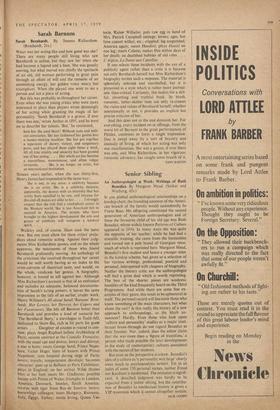Sarah Barnum
Sarah Bernhardt. By (Reinhardt, 21s.) Joanna Richardson.
WHAT was her acting like and how good was she? There are many people still living who saw Bernhardt in action, but they saw her when she had become a legend and a ham. She was greatly moving, but what moved was chiefly the spectacle of an old, old woman performing in great pain through an effort of will and the remains of an astonishing energy, her golden voice weary but triumphant. When she played one went to see a person and not a piece of acting.
But this was probably so throughout her career.
Even when she was young critics who were more interested in plays than players wrote damningly of her acting while granting the magic of her personality. 'Sarah Bernhardt is a genius, if ever there was one,' wrote Archer in 1895, and he went
on to describe her talents. 'But,' he continued, how has she used them? Without taste and with- out conscience. She has fashioned her genius into a money-making machine. She has got together a repertoire of showy, violent, and sanguinary parts, and has played them eight times a week, till all true vitality and sincerity has been ground out of her acting. . . . Her whole art has become a marvellous, monotonous, and often vulgar virtuosity. . . . She is no longer an artist, but an international institution.
Sixteen years earlier, when she was thirty-five, Henry James had responded in the same way :
She is not, to my sense, a celebrity because she is an artist. She is a celebrity because, apparently, she desires with an intensity that has rarely been equalled to be one, and because for this end all means are alike to her. . . . I strongly suspect that she will find a triumphant career in the Western world. She is too American not to succeed in America. The people who have brought to the highest development the arts and graces of publicity will recognise a kindred spirit. . . .
Walkley and, of course, Shaw took the same view. But one must allow for these critics' preju- dices about romantic acting. Against their judg- ments Miss Richardson quotes, and on the whole approves, the testaments of those who found Bernhardt profoundly moving. An anthology of the criticisms she received throughout her career would be well worth having as an index to the cross-currents of theatrical taste, and would, on the whole, vindicate her genius. A biography, however, is bound to tell against her. Although Miss Richardson's account is that of an enthusiast and includes an adequate, balanced documenta- tion of Sarah's acting powers, it leaves the same impression as the title of an earlier, cruder work, Henry Williams's All about Sarah 'Barnum' Bern- hardt. Her Loveys, her Doveys, her Capers and her Funniments. She hits off Barnum better than Bernhardt and provides a kind of scenario for 'The Bernhardt Story,' a travelogue in Todd-AO, dedicated to Show-Biz, rich in bit parts for guest artists. . . . Daughter of cocotte is reared in con- vent; plays Angel Raphael before Archbishop of Paris; secures contract at the Comedie Francaise; with the usual ups and downs, loveys and doveys, a star is born; meets George Sand, Prince Napo- leon, Victor Hugo; hints of liaison with Prince Napoleon; runs hospital during siege of Paris; lovers;. travels; temperament develops; becomes character; goes up in Balloon at Paris Exhibition; plays in England; on her arrival Wilde throws lilies at her feet; meets Mr. Gladstone; possible liaison with Prince of Wales; triumphs in London, America, Denmark, Sweden, South America; returns with tiger from Rio de Janeiro; lovers; horsewhips colleague; tours Hungary, Rumania, Italy, Egypt, Turkey; meets Irving, Queen Vic-
toria, Kaiser Wilhelm; puts raw egg in hand of Mrs. Patrick Campbell onstage; lovers; ages, but time cannot wither, etc.; crippled; leg amputated; America again; meets Houdini; plays Daniel on one leg; meets Colette; makes film within days of her death; on deathbed babbles of old roles . . . L' Aiglon, La Dame aux Camilias . . .
if one selects these incidents with the eye of a publicity agent rather than a critic it is because not only Bernhardt herself but Miss Richardson's biography invites such a response. The material is splendidly selected and marshalled, but it is presented in a style which is rather more journal- istic than critical. Curiously, this makes for a skil- ful, absorbing and truthful book. Its brash, romantic, helter-skelter tone not only re-creates the vision and values of Bernhardt herself; whether intentionally or not, it provides an implicit but precise criticism of her.
And this does not in the end diminish her. For everything, every incident on or offstage, from the worst bit of Barnum to the great performances of Phedre, combines to form a single impression. One is swept away by a sort of bravery and intensity of living, of which her acting was only one manifestation. She was a genius, if ever there was one, and Miss Richardson. in her vigorous, romantic advocacy, has caught some breath of it.
JOHN BARTON


































 Previous page
Previous page